This week I was trying to find a way to write about belladonna so that I could work in the 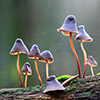 song “Belladonna and Aconite” by Incubus Sukkubus. I had thought about just writing about belladonna and then I thought about the song, which speaks largely to the concept of flying ointment. That led me to thinking “well, maybe this would be best for an F week to talk about flying ointments”…but then it occurred to me that there was a way to make it all work out together. Baneful herbs!
song “Belladonna and Aconite” by Incubus Sukkubus. I had thought about just writing about belladonna and then I thought about the song, which speaks largely to the concept of flying ointment. That led me to thinking “well, maybe this would be best for an F week to talk about flying ointments”…but then it occurred to me that there was a way to make it all work out together. Baneful herbs!
When you’re a new Witch and you’re learning about herbs and their magickal uses one of the big things that you have to be careful of is falling into the trap of baneful herbs. There are a lot of herbs that you hear about in connection to Witchcraft, like belladonna, that are highly toxic and extremely dangerous to work with when you don’t know what you’re doing. I’m not going to tell anyone what to do with their herbs; I would certainly be telling a lie if I said I never experimented with baneful herbs in my magick so I’m not going to tell you that you shouldn’t do it! But you do need to know what you’re doing.
First let’s talk about what a baneful herb is. These are plants that are toxic or poisonous. The herbs we think of most when talking about baneful herbs are those that are connected to the flying ointment recipes of ancient Witchcraft. Most modern flying ointment recipes have removed any of the baneful herbs and replaced them with herbs that are safe for ingesting or applying to the skin but that might have energetic properties that would be favored in this kind of recipe. Yet, there are still those Witches practicing in a traditional magickal path that learn to work with the baneful herbs safely and who still use herbs like belladonna in their recipes.
Many herbs have a variety of different folk names that they are known by. For example belladonna is also known as deadly nightshade or Devil’s berries, among other names. Here are some of the baneful herbs who you might be familiar with.
Datura
Foxglove
Hemlock
Henbane
Mandrake
Mistletoe
Wolfsbane
Pokeroot
Wild Lettuce
Lily of the Valley
Castor Beans
This is obviously not a complete list, but an example of some of the ones that you may come across a lot in books. There are some, like wormwood, that are baneful but that we have learned how to work with over time and have discovered that have limits that can be safely worked within.
It’s highly advised not to burn these herbs since their fumes are possibly toxic to inhale or to use oils or ointments made with them since the toxins can be absorbed through the skin. And it should go without saying not to ingest them either. But if you’re not willing to test the bounds of these herbs, you can still work with them in ritual and meditation through using the herb itself as a talisman or learning to connect with the plant spirit.
I think a lot of people forget that the plant, even the dried leaves of a plant, have a familiar spirit. We can learn to connect with this spirit in the same way that we connect with the spirit of an animal or crystal in order to work with. While the depth of how to do this and how to work with these herbs go far beyond what I am going to cover here now, I will say that if you have an interest in learning how to work with plan familiars, including learning how to work with baneful herbs, I would recommend reading “The Plant Spirit Familiar” by Christopher Penczak.
You can start with working as simply as having the herbs safely contained within a bottle or jar on your altar and connecting with energy of the plant by holding the jar or just having it in your space. I recently made a “Flying Witches Bottle” filled with traditional flying ointment herbs that are baneful herbs and often avoided today. This is something I’m planning to put up in my shop very soon. But when I made the bottle I sealed it with silver wax and placed a skull on the top. The point of this bottle is just to have a way to connect with the essence and energy of flying herbs without having to test the bounds of taking them in through your skin. You can call on the specific properties of one of these herbs to work with you in whatever magick you’re doing.
In the case of many of these baneful herbs they produce toxins that are hallucinogens and they aid in things like astral travel, visions, journey work, and other similar works that takes us off to another plane. I have two bottle of fly agaric my altar. The smaller one with the silver pentacle on it is actually fly agaric in oil and the larger bottle is just the dried mushroom on their own. I use them when I do journey work the most. The shamanic aspect of my practice as increased a great deal in the last few years and I have found that working with plants like this one, which is highly toxic and can be quite deadly, can be safely partnered with when used in this way.
Now comes my inevitable warning/lecture. Do not use these plants and herbs if you don’t know what you’re doing. That should go without saying but it amazes me just how much it DOES need saying. I have talked to people over the years who want to know things like “how much mandrake can I use to get high without getting sick” and “how can I make a safe tea with wormwood to have hallucinations?” I just have to shake my head at these.
When I was living in San Diego this really cute herb shop opened up a few blocks from my house called Happy High Herbs. The shop is actually one of over 30 shops through Australia, the US and the UK. They focus on herbal alternatives to drugs as well as health and healing herbs, recovery assistance, and aphrodisiacs. But among those things there are also herbs for spiritual work and spiritual healing. The shop I would go to had a series of shamanic herbal tinctures for use in meditation and healing. I was there one night, actually my last trip over there before moving back to Salem, I went to take a look at a these tinctures to buy a few that I knew I wasn’t going to find around here. I specifically wanted to get a bottle of Peyotl, which does not contain peyote but is a vibrational essence of that plant family, and it’s used for shamanic journey work, as you would imagine.
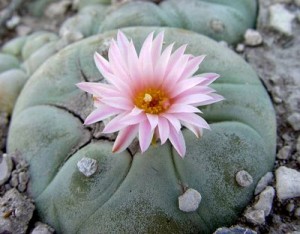 As I was talking to the woman that owned the shop about line of essences this typical SoCal college wannabe stoner guy comes over because he heard us talking about peyote. He asked “So will that stuff get you high? I took peyote once and it made me really sick so I’m not sure I want to do it again but I want to get the high from it.” While I know it probably wasn’t my place to do it, I couldn’t help but go off the guy a little bit. I explained to him that despite what he may think, peyote is not a plant for getting high. It’s a highly spiritual plant that is meant to be taken for specific things. It’s toxic and that’s why it makes you sick. But if you approach the plant with the right intention you’re less likely to have a lot of problems with it because the spirit of the plant knows you’re coming to it with respect and the right intention. When your spirit is not in alignment with the spirit of the plant, you’re not going to be able to work well together. “So in other words,” I said as he began to get a glazed look come over his face, “if you’re using a sacred plant like peyote, salvia divinorum, or any of these other shamanic herbs to just ‘get high’ you’re not using the plant the way it was meant to be used and you’re not going to get the results you hope for.” He looked a little surprised and confused all and the same time and the woman that owned the shop looked a little impressed. She immediately asked me if I lived locally and if I would be interested in teaching classes there but since I was leaving in less than a week that wasn’t going to happen. Which is a shame because I love being able to talk to people about things like entheogens. (I’m hoping to have time later this year to do some blogging specifically on entheogens.)
As I was talking to the woman that owned the shop about line of essences this typical SoCal college wannabe stoner guy comes over because he heard us talking about peyote. He asked “So will that stuff get you high? I took peyote once and it made me really sick so I’m not sure I want to do it again but I want to get the high from it.” While I know it probably wasn’t my place to do it, I couldn’t help but go off the guy a little bit. I explained to him that despite what he may think, peyote is not a plant for getting high. It’s a highly spiritual plant that is meant to be taken for specific things. It’s toxic and that’s why it makes you sick. But if you approach the plant with the right intention you’re less likely to have a lot of problems with it because the spirit of the plant knows you’re coming to it with respect and the right intention. When your spirit is not in alignment with the spirit of the plant, you’re not going to be able to work well together. “So in other words,” I said as he began to get a glazed look come over his face, “if you’re using a sacred plant like peyote, salvia divinorum, or any of these other shamanic herbs to just ‘get high’ you’re not using the plant the way it was meant to be used and you’re not going to get the results you hope for.” He looked a little surprised and confused all and the same time and the woman that owned the shop looked a little impressed. She immediately asked me if I lived locally and if I would be interested in teaching classes there but since I was leaving in less than a week that wasn’t going to happen. Which is a shame because I love being able to talk to people about things like entheogens. (I’m hoping to have time later this year to do some blogging specifically on entheogens.)
So just remember that if your intention is in alignment with the herb and you take the time to connect to the herb you can work with any baneful herb safely either as a talisman or as a plant spirit ally. Knowing the uses of the herb and the possible dangers of it when it’s ingested is important. Remember, just because you’re working with the herb energetically doesn’t mean you’ll never run into a problem. So take your time to study your herbs and know how to work with it. Developing a relationship with a plant spirit is like developing a relationship with an spirit guide in that it takes time and respect.
Oh…and now that Incubus Sukkubus song. 🙂
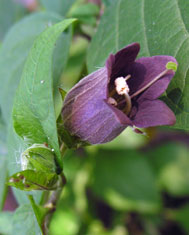
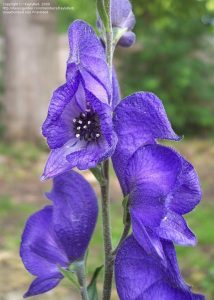
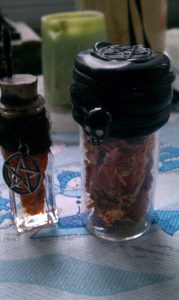




Great article.
Thanks. 🙂
I am just starting with this kind of spirit plant/plant spirit work, (was more of a gemstone/crystal girl before) and I feel a lot of people all too often forget about the inherent power of the ‘ingredients’ they use.
Belladonna, isn’t she just beautiful? (No pun intended, I really adore this plant.)
Don’t you just love when things work out better than you expected? I should send this post to a friend… so she’ll know why hemlock is not the best of choices for home purification; not when you have pets and kits.
Lovely post!
P.S. I absolutely forgot today was Friday *sigh* but I’ll have a post on the 2nd 😉
I enjoyed your article, but spent a bit of time looking up what some of the plant names were, because I only know them under the German and Latin names.
I’m glad you stressed the fact about “don’t dabble with potent plants if you only have a sophomorical experience with them!”. I cringed the other day when I read about someone’s traditional Samhain punch with may apples. Although the recipe stated, “don’t use other parts of this plant”, I really worry about posting these sorts of recipes without some sort of a disclaimer álà “If you have no experience with these plants, then you really shouldn’t try them.” We live in a society where people choke to death over hazelnuts. That’s why I don’t understand why some public witch recipes can say, “Oh, if you just eat one may apple, it won’t hurt you, but a dozen will.” How do they know that? So, if you would except a hint, please edit your blog and make your warning/lecture bold and underlined, because undoubtedly someone will read your blog and think, “Well if Rowan knows what she’s doing, then putting around with poisons is okay for me too, because I’m a witch too.” They forget Rowan knows what she’s doing because she has read every book about herbs she can get her hands on, and if she took a couple classes in chemistry, she could probably pass a pharmacist exam.
The second thing – this part about being a pagan and having herbal knowledge – is always the same wherever you go. What can I get high on? I always tell them: “Beer. It’s legal. It’s cheap. And for most people it is not a one-way trip.” I don’t know why some people believe if you are interested in botany, you are primarily interested in botany because you are looking for unique and interesting substances to get high on.
May interest with poisonous plants began with a symbiotic relationship I had with a rare strain of Datura stramonium I found growing wild. I dug her up and took her home and re-potted her, because the next day there were going to bulldoze the lot she was living on. She liked living on my balcony, and in time she brought forth a very unusual strain of blossoms with a faint tinge of blue. At the time I was suffering from very bad allergic asthma, and sitting with this plant in a closed small room and inhaling the aroma of this plant for an hour relieved the asthma spasms (left me with a headache – but at least I was breathing easier). The pharmacy used to sell the leaves as cigarettes for asthma in the 1920’s , until people began to have psychotic delusions. But I found I did not have to harm this plant to benefit from it. And smoking was out of the question. Just water it and take care of it, and keep it company when the asthma got bad.
P.S. The oldest pure food & drug law on the books is “das deutsche Reinheitsgebot” from 1516. It stipulates only grain, hops, yeast and water may be used to make beer, and it was passed so they would stop mixing bane fruits in the beer – a common practice until this law was passed.
I would like to understand just one thing, even if its possibly not a good questions, why is it I have a reactive vibration to Wolf-bane but then really have no problem & even an attraction to the spirit that is lingering around Wormwood? Is there some kind of energy that is disruptive for one to the other..?
As I have only an intuitive type of thing going on, which is not ritualistic but follows after moon cycles & nature & the plants that vibrate in my own garden & getting to know food plants in the wild (thus avoiding things which may be toxic) I’m really put off by the intensity that the Wolf-bane grows.. I’ve given it away & it still keeps coming back, like a rhubarb.. endlessly & firmly saying “I live here, like it or not” where as I introduced the Wormwood to my garden ring, along with a few other things & these too just took over.. but is more tolerable in spirit.. but oversized in plant! I have cut and dried these to rid the air of any lingering stagnant energies that accumulate, because this is what it wants of me, & sometimes I little stomach settling tea of the flowers, not unlike chamomile only I don’t really like the vibration from chamomile… its not harmonious to my nature for some reason.
I do not “get high” on anything.. but I do enjoy a glass of absinthe (only the good stuff) when available, but still, how can these plants have such strong personalities? So much I would like to understand about that.
I think I try to respect everything in the garden, whether I planted it there or whether it planted itself!
Thank you for your article and your time,
AlterEgoTrip